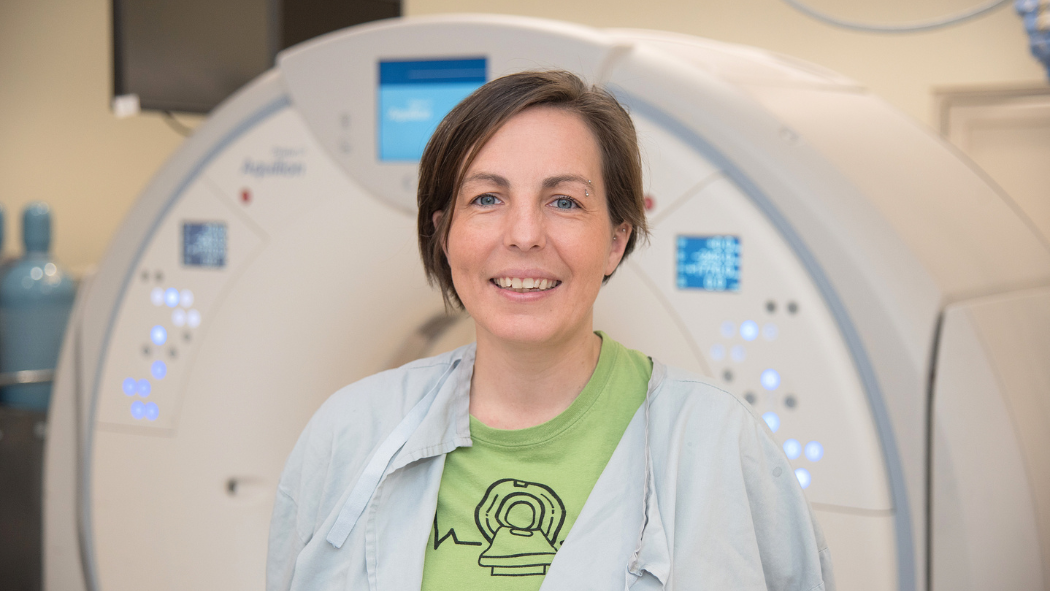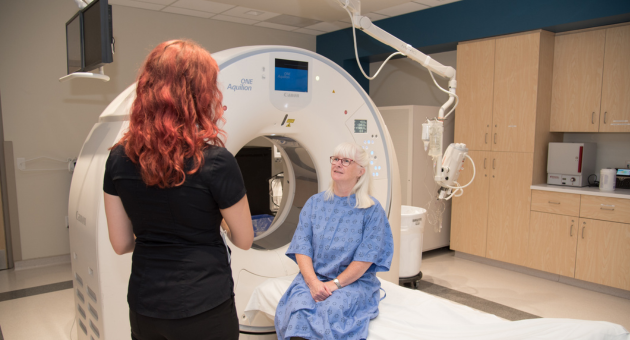
May 15, 2024
By Jodie Hagar, CT Senior Technologist at LHSC
Role of CT Technologist at LHSC
In the dynamic environment of LHSC's trauma setting, the CT technologist plays a crucial role. They skillfully operate CT equipment to generate precise images vital for diagnosing patients accurately. Working closely with multidisciplinary health-care teams throughout the hospital, they deliver compassionate, patient-centered care, aiding in swift assessments and treatments for a wide range of patients.
Becoming a CT Tech
I started volunteering during high school to explore the different professions of the hospital and was intrigued by medical imaging after a high school co-op placement in radiology. While spending time in X-Ray, I found myself going to the back of the department where the CT scan was located every chance I had. It was the collaboration of technology and health care I found fascinating, and still do all these years later. CT Technologists require a Medical Radiation Technologist certification and then extra course work in computed tomography.
Hands on learning at London Health Science Centre (LHSC) was a big part of the Medical Radiation Technology diploma program through Fanshawe College. As LHSC is a teaching facility, we had the opportunity to work alongside and learn from technologists, radiologists and other health-care professionals.
I was encouraged to pursue further educational and research avenues, which lead me to additional courses offered by the Canadian Association of Medical Radiation Technologists (CAMRT). I then successfully obtained my specialized CT Imaging Certificate (CTIC).
Continuing Education, Learning and Research Opportunities
I now have colleagues who are exploring research as lead investigators on various projects. As CT Technologists, we have dedicated time available for these pursuits. The projects are focused on improving our processes as well as patient safety and experience.
I recently had the chance to take on the role of Accreditation lead. It was more of an educator role, where I enthusiastically shared insights with fellow staff members, and emphasized the importance of aligning LHSC's processes with the highest health-care standards. It was truly gratifying to play a part in enhancing our institution's commitment to excellence.
Presently, I am serving on the Medical Imaging Professional Development committee, where we actively cultivate a culture of ongoing learning and personal growth. It's a rewarding opportunity to inspire and support my colleagues in their pursuit of further educational achievements. Together, we strive to empower each other to reach new heights in our professional journey.
Daily Impact on lives

Photo: A CT technologist explains the scan to a patient.
My role in the CT department goes beyond diagnostics. Whether assisting in biopsies or participating in treatments like ablations, I collaborate closely with nurses, residents, and radiologists. Every day brings a diverse array of patient populations into my care—emergency cases, inpatients, outpatients, from the tiniest babies to adults. In such a bustling department, and the learning never stops. I cherish the opportunity to constantly improve.
What I love most about my role is the chance to touch lives across LHSC—whether it's comforting children, supporting cancer patients, or aiding trauma cases, every interaction matters. I am grateful to be part of a dynamic team that prioritizes innovation, excellence, and above all, patient-centered care. It's what drives me to make a positive impact each and every day, and I couldn't be happier with the difference I get to make.
Are you interested in growing your career at LHSC? Check out current opportunities online or connect with the Recruitment Team recruitment@lhsc.on.ca to learn more.
